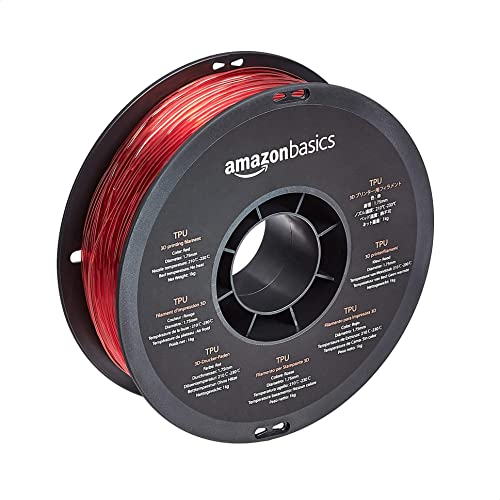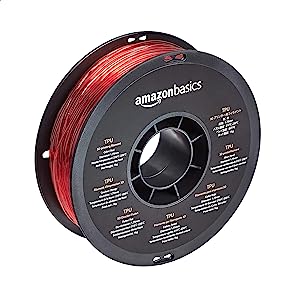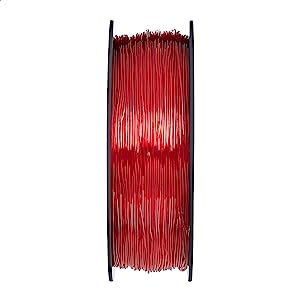Amazon Basics TPU 3D Printer Filament, 1.75 mm, Red, 1 kg

Amazon Basics TPU 3D Printer Filament, 1.75 mm, Red, 1 kg Spool (2.2 lbs)


Care Instructions
Return any unused filament back to its resealable bag for future use and to ensure secure, optimal containment. The AmazonBasics filament comes vacuum-sealed in a desiccant bag to keep it fresh, dry and dust-free for optimal 3D results.
| Weight: | 998 g |
| Size: | 1.75 mm |
| Model: | ETPU175R1A |
| Part: | ETPU175R1A |
| Colour: | Red |
| Pack Quantity: | 1 |
| Batteries Required: | No |
| Manufacture: | Amazon Basics |
| Quantity: | 1 |
| Size: | 1.75 mm |
Took a while to get the temps and flow rates dialled in to my machine. Some colour variation dependant on head travel direction.
Adhesion issues with recommended bed temp. 60c seems to be the sweet spot.
Brilliant value too
Being the adventurous sort on a tight budget I ignored common advice and bought some. That was three years ago. Since then I have purchased several more rolls and a a few of these multipacks (when they are available.
To be fair to Amazon they don’t make any claims to this being premium pla. Are there better ones? Absolutely there are. For many you pay quite a bit more as well. On a budget, this pla is just fine. I get perfectly satisfactory prints with high detail and reliable replication across different prints. It melts between 210-215 degrees nicely doesn’t spit, blob or run. So far, I have found this pla to be one of the most consistent and reliable at this price range.
As with anything, a lot of the result is in preparation. Making sure the model is set up properly for printing in the slicer is most of the issue. The more detail you want, the more carefully you need to set up the slice. For statues and hero figure prints you also need to consider the print head that is being used. Most pla printers come with a standard 0.4 head fitted. This is a perfectly fine general use head. But for figure prints you might want to use something smaller. I have the best results for heroic statue prints with a 0.2 head. The print take longer, you need to take a bit longer in the slicer settings, but the end result is excellent. I printed a Jack Sparrow statue for my daughter using this pla, in 1/10th scale. With a 0.2 head and this pla the end result was as good as a resin print – although the resin model would have been quite a bit smaller.
I use this pla for general purpose, vehicles, scenic items for game boards, scatter terrain and similar. If I have to print something of particularly high quality then I will use a smaller head, but I don’t automatically reach for the higher priced pla. More often than not I will start printing with this – a couple of small pieces from the whole model, then after inspecting them I will either continue or use a more expensive pla. So far, I have used a lot more of this than I have of the other pla variants that are available.
I’ve attached a few photos of stuff that has been printed with this pla. They should illustrate that it is possible to get detailed and complex prints from Amazon filament.
I cannot fault this filiment at all, it was the lowest price for a full 1kg and I will definitely be buying agai
Never printed a flexible material before, however this seems to be a decent choice. Its not very elastic, but it is very flexible and bendable. Prints OK as well. Pretty clean prints, not as smooth as PLA but wasn’t expecting it to be. Still all features can be made out without issue so would happily buy again.
I purchased this TPU filament to 3D print some phone cases. I set the temperature at the recommended 210c with the bed heating element switch off. I have to say the print was excellent! There was very little clean up, a few minor bits of stringing around the camera lens cut out and charger port, but the filament literally brushed away by hand. I wasn’t expecting much of a sheen with this filament however it really does have a silk look to it. Really impressed and will definitely be buying this again!
I hope that you found my review helpful
Using the red TPU and it prints very well. So far tested making a few cable ties and a 40x40x2 mm cube. Sticks well to the bed and prints with good dimensional accuracy. Flexible as expected, stretches a little, and well with a model designed to stretch (such as cable tie with loops).
Settings:
Nozzle: 0.4 on a direct drive
Temp: 220c and 210c (no problems with either)
Bed: off
Speed: 60mm/s to 5mm/s (for short loops, probably could go faster)
Retr: 3mm (didn’t do a retraction test so could be suboptimal)
Worked well, 60c bed 200c extruder. Not keen on the finish, this might just be what silk is like but knocked it down 1 star as I don’t like the finish.
The spool arrived nicely packed in the usual vacuum packaging, along with a spare ziplock bag to keep it in after opening. Installed into the Anycubic Kobra without any fuss, ensuring the feed roller tension was lowered.
Printed an Oculus Touch grip from Thingiverse at 210c on the head 50c on the table at 40mm/s. Sliced in Cura 0.2mm per layer with the minimise travel option selected and 0.5mm retraction.
Took longer than PLA at 120mm/s, but that’s to be expected but produced a really well finished grip with smooth details.
Printed to the reverse side of the PEI plate, as I’ve read TPU can damage the PEI surface, and it adhered without issue and removed easily afterwards.
Would be nice if the spool/product info included hardness info, as it was, went with the default 95A Generic TPU option in Cura and seemed to have no problems.
This was my 1st spool I bought after using some of the free sample included with my 3d printer.
I found the adhesion to be slightly inferior that what i had previously used.
I adjusted a few settings ( lowered the Z axis) and heated the print bed a little more and it all seems to wok perfectly.
It might be worth keeping note on every brand of filament so you can fine tune it next time you use it.
I did find it was wound slightly badly and got tangled at 1st, but that soon cleared up.
The Silver is a great finish and colour. I’ve had not blockages so far and I’m about half way thru.
Like I say, my only note would be to keep the temperature nice and warm when using.
Despite that the prints are pretty much faultless. Bed adhesion (heated) was good and the filament performs well at a range of temperatures. This pearl lustre is pleasant and while this filament was surprisingly good for the price and produced mostly tools (I bought this instead of white by mistake) it should be excellent for decorative prints and lithophanes.
What really surprised me was the addition of simple but thoughtful things that I hadn’t imagined would come att his price: specifically a re-sealable bag and some moisture absorbent material in the reel! This is really neat because unless you’ve heard about the vacuum cleaner bag trick, it will allow you to store your PLA for months at a time when not in use and not end up as wetter than my washing when I left it out in the rain *(again).
PLA isn’t the worst offender for its hygroscopic properties (nylon takes that crown) but it is still prone to it, particularly in the summer months when air is holding more moisture.
So turns up next day, thumbs up, colour a lovely vibrant yellow, thumbs up.
Set printer off, about a 3 and 1/2 hour job. Watching via octoprint looking good. No or very little stringing (head 205, bed 60 btw). Looking good.
So heads to garage to have eyes on, here is where my gripe comes in. The smell, I’ve used esun, and dreality own filament previously and they were very subtle in what smell they produced. This how is way more pungent.
No worries really, just not going to stay in garage, and vent it later when the print is finished.
I tried the filament in green color. Bought really at a low price, I didn’t expect much and instead I had to change my mind.
I mostly tested the filament to print pots of different sizes and the organizer for the zombicide green horde board game.
The filament works well at 190 degrees, I found some difficulties with adhesion to the print bed but nothing unsolvable by setting the heated bed to 60 degrees.
The thread is surprisingly well coiled to the spool, which allows for a uniform print flow. I did some test prints with the calibration cubes and after some adjustments I got more than decent prints. I currently use anycubic filaments which have a better yield, however in the future when I have to print large and not very detailed objects my choice will surely fall on this filament.
So i’ve a few hours working with this PLA. I own an Ender 3 and CR-10Pro v2 on both machines i had dialled in my settings perfectly (always used sunlu pla) however that didn’t cut it because this material requires some tweaking of settings to get it right so ignore all your settings you have for other PLA/material and dial them in once more. To get that ideal squish of filament you are going to have to push the temp slightly higher (210c is what i’ve found best in my case, of course this varies on your ambient temps so its something you have to play around with) I also had to drop the z height of the printing head to much lower than i did with Sunlu PLA. If you can start a test print at 50% speed and dial the Z height in as you go then you will find the ideal height for this.
I was ready to write this PLA off and return it but i’m glad i didn’t because it does produce good prints. I wouldn’t say its perfect due to the extra steps you need to take in order to get it going but for the price (45 for 3 rolls) i can’t complain. Will it be my go to for PLA? I don’t think so but with how prices are fluctuating right now with Sunlu material its a good interim until prices settle again.
I do have a ENDER 3 3D printer.. my setting for this are 205celsius nozzle and 82celsius Bed. I have a glass bed, and for good adhesive i wash it before each print i make.
Pros : – good for the money
– good for who want to use more than 1 spool for small projects, and dont want to invest into expensive fillaments.
Cons. – (this is for the guys who makes this fillament)
– Please STOP using such a big `instruction manual` for the filament, and dont waste paper for it. It dosnt worth.
– IT should be in vacuum bag, but as you can see in the pictures it missed the part of `Vacuum`, it is only in the transparent foil.
Overall 4 stars from me.
I struggled with this one initially, until I discovered that the average diameter is more like 1.70mm rather than 1.75mm. It is, however *consistently* undersized so you can just crank up your flow rate to compensate. The actual extrusion is more consistent than other cheap brands I’ve tried.
It seems more prone to stringing and oozing than other filaments, so don’t print hot (I’m at 200C atm, might drop down further). Retraction may need adjusting.
It is, as another user pointed out, prone to adhesion problems. My bed is fairly good for adhesion, so as long as I have enough squish it sticks. Small parts need a brim. But I can imagine this filament being a nightmare on glass compared to others.
Colour wise, for single layers it just looks like a darkish translucent green, but after a few more layers it really brightens up, but also becomes more opaque (like most translucent filaments do due to refraction). A thick printed part with lots of infill and walls will look REALLY bright, practically fluorescent. This makes me wonder about the lightfastedness of the pigment…only time will tell. The final colour is on the more yellow side of the green hue spectrum. Note that you will be able to see infill with this filament, so if aesthetics are more important than strength, choose your infill pattern wisely.
It seems surprisingly strong and prints surprisingly well for a budget filament. I will be ordering more Amazon Basics reels if they’re all this good for the money. Far better than e.g. Geeetech PLA.